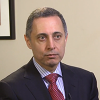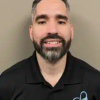Premier - Local Orthopaedic Surgeon
-
Shoulder Dislocation
A dislocated shoulder is an injury in which your upper arm bone pops out of the cup-shaped socket that’s part of your shoulder blade. The shoulder is the body’s most mobile joint, which makes it susceptible to dislocation. If you suspect a dislocated shoulder, seek prompt medical attention.
-
Shoulder Instability After Shoulder Dislocation
Patients who present with recurrent dislocations of their shoulder joint usually don’t have much in the way of pain as their primary complaint. Their main complaint is that of a feeling of instability in the shoulder or “My shoulder feels like it’s partially coming out of joint.”
Or, it’s actually dislocating with sometimes simple activities: rolling over in bed, sneezing, or when they’re playing their sporting activities.









